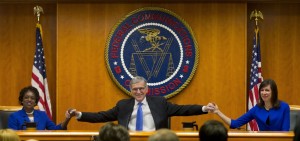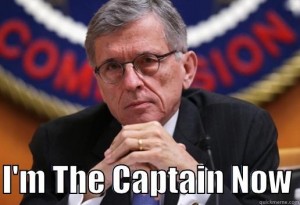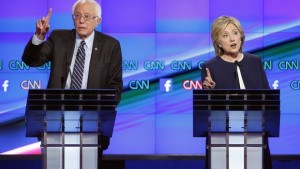
Having no position is basically the same as siding with the FBI.
Last week I wrote an article taking the Republican presidential candidates to task for not understanding the broad implications of the Apple and FBI situation. I didn’t consider at the time what the two Democratic candidates’ positions were. So I did a little reading and found that while the Democratic candidates were not firmly on the side of the FBI as the Republicans were, they too didn’t seem to grasp the possible ramifications of Apple being forced to comply with the FBI order. In some way, their weak-kneed refusals to choose a stance are perhaps even worse than what the Republicans stated. I’ll explain why.
Bernie Sanders said he is on “both” sides of the issue. He said he is fearful of “Big Brother” but he also worries about another terrorist attack. Ultimately he says that he believes that middle ground can be reached. At first glance this seems like a perfectly balanced, rational answer, but it shows a tacit ignorance of the technical issues involved. Political compromise will not work in the real world of data encryption.
Hillary Clinton basically offered the exact same answer as Sanders. She also fears abuse of encryption backdoors by “authoritarian regimes,” but believes that there must be a way to find a solution that both keeps data secure and allows law enforcement access. Again, seemingly reasonable but only if one does not understand the underlying technical issues.
Wishy-Washy Pandering
The answers given by both Democratic candidates are political cop-outs. They are not true position statements. While I appreciate the fact that at least these two candidates aren’t calling for Apple to comply with the FBI order, by not specifically siding with Apple, they are leaving the door open for some sort of “compromise.” In this situation, to call for compromise is to implicitly end up on the side of the FBI, which is to stand against individual privacy and security.
The reality of strong encryption is that *ANY* sort of backdoor weakens the encryption protocol to the point of insecurity. Any weakness will eventually be exploited. I find it hard for anyone who does not understand the underlying technical aspects of strong encryption, let alone government officials or political candidates, to propose solutions that verge on pure fantasy. The type of compromise that the the Democratic candidates floated (which is basically what the FBI director wants) is what is termed the “magic pony” solution because it is more wishful thinking than technical reality. I do not know of a single cryptographic expert who would claim otherwise, and even publications like the MIT Technology Review agree that there can be no technical middle ground on strong encryption.
I stated earlier that the Democratic candidates’ responses are potentially worse than the Republican candidates’ positions. By floating false solutions, the Democrats are setting the stage for people to believe that a “compromise” is possible. There is no more dangerous position to hold than one which deceives people into a false sense of security. If people believe that a solution can be created that allows for truly secure encryption that law enforcement can decrypt, they are going to be sorely disappointed when the final political solution shows itself to be insecure. At least we know where the Republicans stand and we can fight their positions with no pretense. When a candidate shows no position or shows a proclivity towards political compromise, we may not know what we will end up with until after they are elected and it is too late.
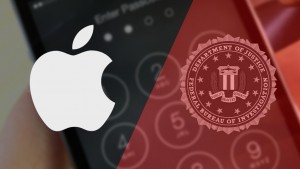 In analyzing the Apple and FBI court case over the iPhone used by a San Bernadino terrorist, it has become quite obvious that many people are not completely comprehending the entirety of the facts. Unfortunately for Apple, I believe the complexity of the situation is hurting their position in the public eye. The FBI’s side of the issue has generally become overly-simplified. “Apple needs to unlock the iPhone of a terrorist,” is all that many people comprehend. I believe it has been hard for most people to understand the nuances of Apple’s defense. As with anything relating to technology, people can get easily bewildered by explanations of complex topics. Given an overly simplistic and one-sided viewpoint, it really is no wonder that there is much confusion over the issue. When people are not clear on a subject, they tend to fall back to whatever side feels the “safest.” In a case like this, it is no wonder public opinion appears to lean towards the side of “national security.” As proof of this, all one has to do is consider the fact that no candidate from either the Democratic or
In analyzing the Apple and FBI court case over the iPhone used by a San Bernadino terrorist, it has become quite obvious that many people are not completely comprehending the entirety of the facts. Unfortunately for Apple, I believe the complexity of the situation is hurting their position in the public eye. The FBI’s side of the issue has generally become overly-simplified. “Apple needs to unlock the iPhone of a terrorist,” is all that many people comprehend. I believe it has been hard for most people to understand the nuances of Apple’s defense. As with anything relating to technology, people can get easily bewildered by explanations of complex topics. Given an overly simplistic and one-sided viewpoint, it really is no wonder that there is much confusion over the issue. When people are not clear on a subject, they tend to fall back to whatever side feels the “safest.” In a case like this, it is no wonder public opinion appears to lean towards the side of “national security.” As proof of this, all one has to do is consider the fact that no candidate from either the Democratic or 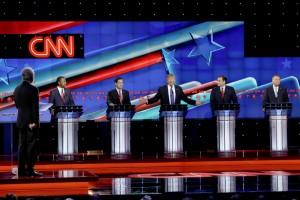
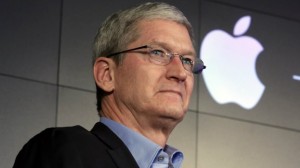 It’s no secret I have a great interest in the technology industry, especially when it comes to the topic of Apple. I also have a great interest in history and politics, hence the name and topic of this blog. So when the situation with
It’s no secret I have a great interest in the technology industry, especially when it comes to the topic of Apple. I also have a great interest in history and politics, hence the name and topic of this blog. So when the situation with 
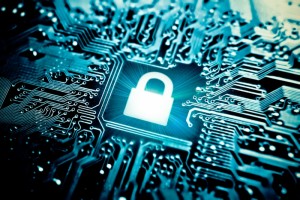 It’s an issue that has been brewing over the last year-and-a-half. When Apple introduced iOS 8 in the fall of 2014, one particular feature had privacy advocates cheering. That same feature had certain law enforcement officials seething.
It’s an issue that has been brewing over the last year-and-a-half. When Apple introduced iOS 8 in the fall of 2014, one particular feature had privacy advocates cheering. That same feature had certain law enforcement officials seething. 
